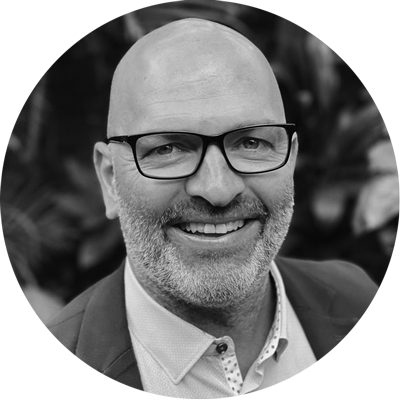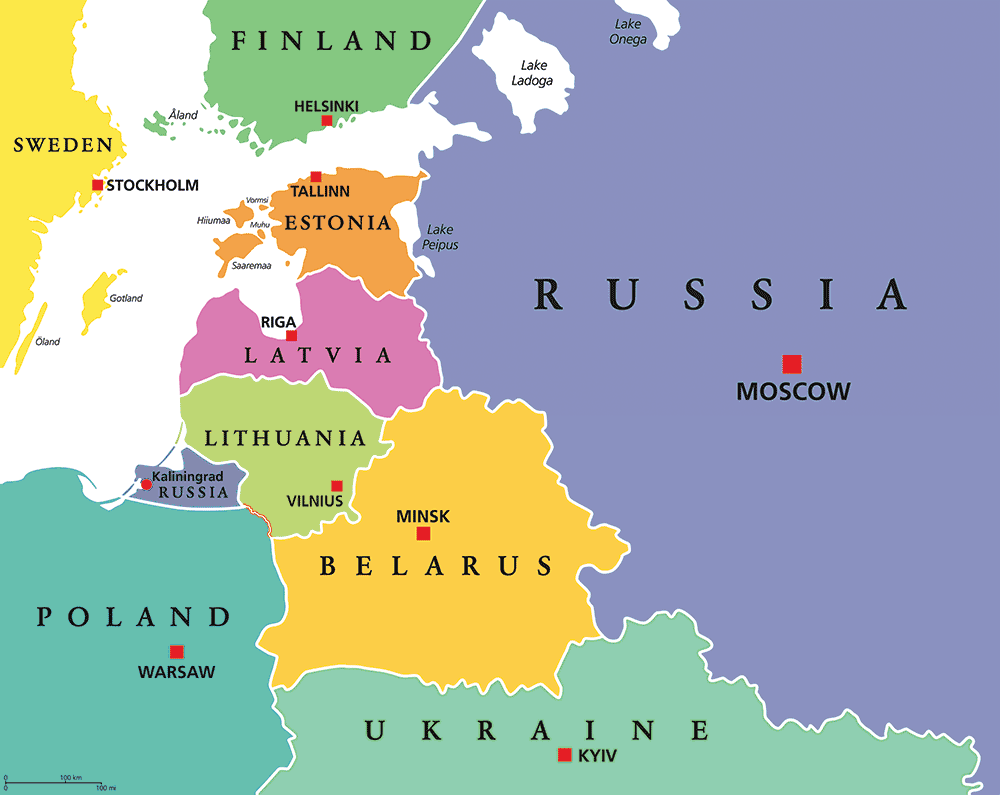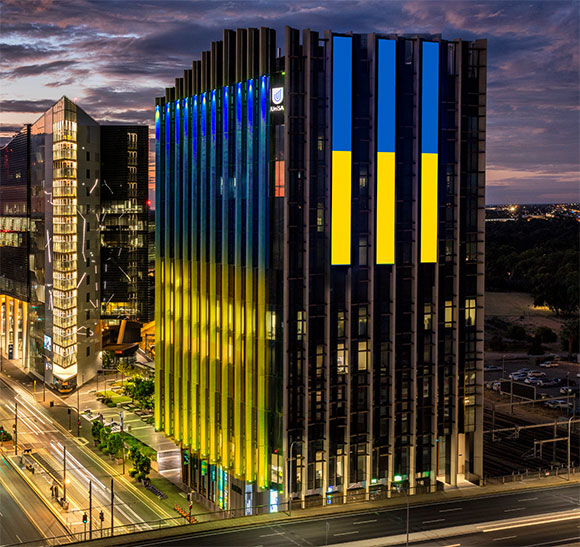04 October 2023
AUTHOR: Will Venn
Earlier this year, UniSA expert in international affairs Dr Adam Simpson travelled to Europe to research the Russian invasion of Ukraine. The articles he has written about the conflict, from a unique vantage point, offer clarity within the fog of war and underline why Australians should care about a conflict that is more than 10,000km away.
In the early 1990s, the dissolution of the Soviet Union and the rise of democratically elected governments across several East European countries, led one political scientist to claim it wasn’t just the end of the Cold War, but the “End of History”.
Three decades on, author William Faulkner’s quote: “The past is never dead, it’s not even past” would prove a better epithet, as the Russia-Ukraine conflict – which many have called the most momentous European conflict since World War II – is partly a legacy of that era.
Historians have the benefit of hindsight in developing narratives that provide understanding about the past, but for real time analysis of current geopolitical events, the discipline of International Studies provides more immediate insights.

UniSA senior lecturer in International Studies Dr Adam Simpson travelled to Eastern and Northern Europe earlier this year to research the conflict in Ukraine, using his expertise to sift fact from fiction in a war clouded by disinformation campaigns. This work also informs his teaching in Global Politics courses at UniSA.
“Studying Global Politics provides the tools to better understand and analyse international affairs and global issues, particularly in terms of assessing the reliability of sources and identifying disinformation/misinformation and propaganda from dubious sources,” Dr Simpson says.
His work, published by influential journals including The Strategist and The Interpreter, details the complex history of the conflict, but from a first-hand perspective, as Dr Simpson moved through countries and areas bordering the conflict zone.
“The trip and the research project evolved because the full Russian invasion of Ukraine in 2022 has largely upended post-Cold War assumptions regarding conflict between major states,” Dr Simpson says.
“Since the end of World War II, there has been a gradual reduction of interstate conflict and particularly the invasion and annexation of another country, which previously formed the basis of imperialism and interstate conflict for centuries.
“Since World War II and the establishment of the United Nations, the invasion and annexation of one’s neighbour has generally been considered rather poor form.”
Dr Simpson teaches Global Politics and Development and found himself spending an increasing amount of time interpreting events in Ukraine and explaining the significance of developments there to his students.
“It was a natural progression to start investigating the conflict in a more in-depth manner as a research project.”
Dr Simpson’s expertise in the politics of Southeast Asia, particularly Thailand and Myanmar, have proven instrumental in evaluating the Ukraine conflict.
“My experience undertaking research on genocide, civil conflict, authoritarianism, military coups and human rights in these countries has provided a solid foundation for understanding and analysing these issues in the Ukraine conflict,” Dr Simpson says.
Stark reminders of the past
Dr Simpson documented his visits to the ominously named “Museums of Occupation” in the capital cities of Baltic countries Estonia, Latvia and Lithuania.
In an article published by the international policy think tank the Lowy Institute, Dr Simpson reaffirms the notion that the history associated with the invasion and annexation of these states – by both the Soviet Union and Nazi Germany during the Second World War – is something that should never be forgotten.
“Each museum has its own idiosyncrasies – the Lithuanian one in Vilnius is housed in the old KGB headquarters with exhibitions in the former torture and execution chambers in the building’s basement – but the overarching message is the same: remember, and by remembering, ensure that this never happens again,” he writes.








Soviet victory at the end of World War II marked the start of a further 45-year-long period of occupation and oppression of these Baltic states. National identities were repressed as Moscow sought to extinguish languages, cultures and any political opposition through bureaucratic regulation, population transfers and mass deportations of “undesirables” to Soviet gulag camps thousands of kilometres away.
Even though Estonia, Latvia and Lithuania gained independence from the then USSR in 1990/91 and joined NATO and the EU in 2004, Dr Simpson points to Russia’s invasion and occupation of parts of Georgia in 2008, as “reigniting concerns in the Baltics regarding Moscow’s and President Putin’s imperial ambitions”.
“Lithuania’s military budget has tripled since 2008 in response,” Dr Simpson says.
“While the likelihood of significant incursions into NATO territory is very low given current scenarios, the hybrid nature of Russian actions in Georgia in 2008 and in Ukraine in 2014 indicates that that is Moscow’s preferred modus operandi."
The risk of conflict expanding
“The longer the Ukrainian conflict continues, the more likely it is that some breach of NATO borders will occur.”
It’s a bold statement informed by Dr Simpson’s own journey. Dr Simpson crossed the Suwałki Gap – a 65km long border between NATO countries Poland and Lithuania, sandwiched between Russian ally Belarus, and Kaliningrad, the Russian enclave on the Baltic Sea.

Dr Simpson says a number of factors have created "a heightened tension and level of insecurity" in the area. These factors include Poland’s claim that Belarusian military helicopters had violated its airspace; the movement of Wagner troops closer to the Suwałki Gap; and the assumption that in any conflict with NATO, Russia, with cooperation from Belarus, would move quickly to occupy the short stretch of land to cut off a NATO land bridge between the Baltic states and western European NATO members.
Such observations allow Dr Simpson to identify the potential risks of the conflict escalating and how that could eventuate.
“While it’s extremely unlikely that Russia will directly attack NATO members, the edging of the Ukrainian conflict towards NATO borders raises other potential concerns,” Dr Simpson says.
“The first possibility is that some form of hybrid threat emerges along the Belarusian border, such as manufactured refugee flows or Wagner fighters, or otherwise unidentified ‘little green men’, breaching the border with activities that offer the Russian government plausible deniability.
“The other possibility is that missile or drone attacks aimed at Ukrainian territory cross over into NATO territory by mistake as happened recently in Romania, a NATO country.”
A less likely scenario is direct invasion by Russia, but the flat terrain from Poland through the Baltic states to Tallinn in the north of Estonia, prompts concerns.
“Along with the history of occupation, it is this topography and the proximity to Russia that makes Baltic political and military planners nervous,” Dr Simpson states. “Due to the flat terrain, it has generally been assumed Russian tanks could well reach Tallinn in two days, although Russia's experience in Ukraine may be cause for some revision of this assumption.”
Dr Simpson’s insights – distinct from speculative op-eds – are underpinned by on the ground research, including meetings with academics from local institutions who live and experience what it means to be close to Russian borders.
Influencing opinion and policy
Dr Simpson’s policy analysis and recommendations are published in outlets related to think tank organisations, such as The Strategist and The Interpreter, that help inform and influence government policy.
Australian Institute of International Affairs (AIIA) national operations manager Nancy Schneider, who’s also editor-in-chief of the AIIA’s online publication Australian Outlook, says Dr Simpson is “creating a witness account and creating that level of expertise within the context rather than observing the context from afar”.
“Dr Simpson is disseminating this information to a broad audience so that others will read and form their own opinions about what's happening in this region. Hopefully that contributes to a deeper understanding of why things happen the way they do.”
Schneider says the articles are read by politicians, their staff and public servants, allowing them to gather “different pieces of information from lots of different sources and putting that together to provide a brief but hopefully more complete picture of what's happening in the world”.
“That informs the policy that is made in the room, whether it is in Parliament House or within a government department such as the Department of Defence or DFAT.”
What happens in Ukraine affects the world
She says the question of Ukraine’s relevance and significance to readers more than 10,000km away in Australia, has a simple answer.
“Nothing in the world happens in a vacuum. That includes Australia, which is geographically isolated from the rest of the world and is often insulated from what's happening in the rest of the world.
“We live in a very connected world so things happening in Europe, America or China all affect Australians, and things that we may not realise at the time, but only at a point 10 or 20 years later, all have a significant impact on what happens in Australia.
“We do ourselves a disservice if we say, oh that's Europe, that’s really far away, it doesn't affect us.”
Schneider highlights the impacts being faced by Australia’s wheat farmers, who are having to supply more wheat and grains to a more diverse customer base than ever before, in a bid to help meet global demand, which has skyrocketed because of the Ukraine conflict.
“These farmers are not the people you would think of as being on the frontline of the impact of a conflict, but they absolutely are. So, there is no reason to think that just because we're far away from things, that we're not involved.”
Dr Simpson says that involvement extends beyond global supply chains and strategic alliances and onto broader concepts and shared ideals that are not bound by physical borders.
“Democracy is often undervalued by those who live in democratic states such as Australia and the US. Indeed, it is ironic that those on social media criticising the Western military and governments for supporting Ukraine would likely face up to 15 years in jail if they did the same in Russia,” Dr Simpson says.
“Those who have lived under authoritarian and imperialist rule know the value of fighting for democracy.
“The only way to protect democracy in Eastern Europe is to defeat Russia in Ukraine. Unfortunately, the outcome in Ukraine is highly dependent on support from the US and it is likely that a win by the Republican party in next year’s presidential elections will result in reduced support for Ukraine.”
The significance of the conflict in Northern Europe is highlighted by the Nordic countries, Sweden and Finland – who remained neutral throughout the entire Cold War – abandoning their precious neutrality in response to the invasion of Ukraine and applying for NATO membership. Finland has already joined, while Sweden hopes its membership will be secured later this year.
“These countries would not be forsaking their neutrality if the threat from Russia was not real,” Dr Simpson says.
Dr Simpson noted on his travels through these countries that public support was a key reason those governments have provided additional military support for Ukraine, including American-made F-16 fighter jets.
It is yet another example of the impact of the conflict rippling out. Its consequences are ongoing and its conclusions yet to be determined.
The premature claim that history had reached an endpoint in 1990 was based on the presumption that democracy had triumphed over authoritarianism in this region of the world for good.
Yet as Dr Simpson’s analysis of the Ukraine conflict reveals, democracy is precarious, borders can be fluid and history is relentless.
Further reading: Ukraine counteroffensive makes gains but dark clouds loom in Washington.
Main image: UniSA expert in international affairs, Dr Adam Simpson, in front of the Salaspils Soviet era memorial on the site of a Nazi labour camp in Latvia.

You can republish this article for free, online or in print, under a Creative Commons licence, provided you follow our guidelines.


